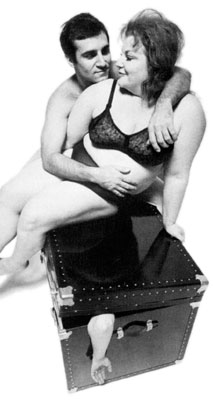




|
|
 |
||
|
|
 |
||
 |
|
||
 |
|||
 |
|||
|
Martha Beck and Ray Fernandez killed as many as 20 people in a scheme to bilk lonely women out of their savings. Martha and Ray were finally convicted of murder in three cases and sentenced to the electric chair. Martha was overweight and unmarried and destined to remain that way — until she communicated with Ray through a "Friendship Club." After trading letters with him for several weeks, they finally met, and it was love at first sight. She gave up her job as a head nurse at a hospital in order to be Ray's constant companion. But Ray's only source of income was in bilking lonely women out of their savings. So with Martha posing as his sister, Ray continued to ply his trade. Martha even watched as Ray married some of these women so that he could get closer to their bank accounts. But Martha's deep insecurity about her looks and her suspicions about Ray's philandering ways sowed deep conflicts, leading to arguments and eventually murder. In the most carefully documented case, Martha took a hammer and crushed the skull of a Florida woman who had drawn her entire savings out of the bank and accompanied Ray and Martha back to New York. Ray then finished the job by strangling the woman and burying her body in the basement of his house. Ray and Martha went to the electric chair while continuing to profess their love.
Kastle wrote a screenplay based on this story and then went shopping for a director. He found a young Martin Scorsese, who had recently scored with his debut feature film Who's That Knocking At My Door? However, with a total budget of only $250,000, Kastle became concerned as he watched Scorsese spend several hours trying to film a tin can in a bush — "It'll create mood," he told Kastle. Eventually Kastle decided they'd quickly run out of funds with Scorsese as director. So he fired Scorsese (!) and began looking for a replacement. He found no one. With the project poised to founder, stars Tony Lo Bianco and Shirley Stoler urged Kastle to take over the direction, and with no immediate alternative, he did. Never mind he had no directing experience whatsoever. He was a composer. He knew opera. But Kastle had a vision of what he wanted to see on film and he had the determination to see the project through to its completion.
The resulting movie is one of the most astonishing independent films of the past 40 years. It's uncompromising and brutal. It's stark and unsettling. Filmed in documentary-style in black and white, The Honeymoon Killers looks terrifyingly real. You feel guilty while you're watching it, as if you're peeking through a keyhole and seeing things you were never meant to see. True to his intentions, Kastle did not glamorize crime. He created a perverse and ugly love story that fascinates precisely because it's so perverse and ugly. Shirley Stoler soars in this movie. She gives one of the great unselfish, unglamorous performances in cinema history. (Her subsequent roles were few in number. Most people probably know her as "Mrs. Steve" on Pee Wee's Playhouse.) And Tony Lo Biano is excellent as Ray. (Soon after The Honeymoon Killers, he would star in The French Connection and The Seven Ups, and he would star in one of the best TV crime shows of the '70s, Police Story. But since then almost all of his performances have been in supporting roles.)
Stoler and Lo Bianco are surrounded by several fine supporting performances. Doris Roberts (who now stars in Everybody Loves Raymond) plays Martha's friend Bunny (looking very thin!), who urges her friend to begin writing letters to the Friendship Club. Mary Ann Higby plays a woman 30 years Ray's senior. She's so eager to be with Ray that she does whatever Martha and Ray request. And Kip McArdle plays a pleasant but insufferably upbeat middle-aged woman with a young daughter. She marries Ray and even remains upbeat with Martha prowling the halls of her uncluttered suburban home. In one the movie's most chilling scenes, McArdle confesses to Martha that she is now pregnant with Ray's child, hoping for Martha's advice and fearing that Ray won't want the baby: he was terrified that Martha would even find out the marriage had been consummated. We see Martha's face stiffen and we know things will soon get very ugly.
Strangely enough Kastle never made another movie — but not for trying. However, no subsequent projects ever came to fruition. That's our loss because he shows amazing skill in The Honeymoon Killers. The Criterion Collection's new DVD release of Honeymoon Killers is a first-rate edition of Kastle's lone journey into filmmaking. The disc includes several valuable extras, such as a 20+ minute video interview with Kastle, who speaks intelligently about the movie and offers many insights. For example, he originally wanted to call the movie "Dear Martha," but the distributor insisted on a more salacious title. He hated "The Honeymoon Killers" title but he had to give them something. The disc also includes bios on the principal talent behind and in front of the camera, and it includes an extensive essay with several stills of the real Ray and Martha and examples of their letters. You won't find a commentary track on this disc, but the Kastle interview and the essay by Scott Christianson more than compensate.
|
|